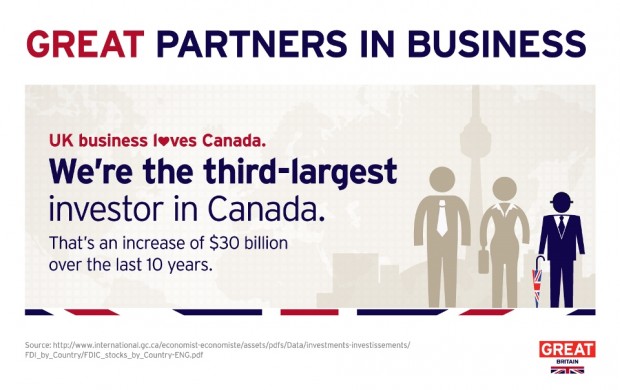
The EU-Canada Comprehensive Economic and Trade Agreement (CETA) is predicted to boost the UK economy by £1.3 billion per year. It’s due to come into force in 2016, but the British government is already working to promote the opportunities it offers. The agreement’s scope and sectoral coverage is extensive across the spectrum of goods, services, and investments. It will present new opportunities for British companies looking to access the nearly C$2 trillion Canadian market.
The CETA text comes in at just over 1,600 pages making it impossible to capture in a blog all of the opportunities for British companies. Instead, I’ll highlight some of the key benefits to UK business.
For spirits producers CETA will fully eliminate tariffs on products that currently pay duty, such as gin, vodka, and rum. CETA will also eliminate the blending requirement for bulk imports of distilled spirits before they can be bottled. As well, CETA now prohibits cost of service fees charged by liquor boards on an ad valorem basis rather than a volume basis. This means that exporters sending over higher value products will no longer be punished compared to lower cost products which are the same volume.
Manufacturers will see full elimination of all tariffs, with the majority of these going to zero immediately upon entry into force. For some sectors, such as automotives and ships, there are phase outs ranging from 3-7 years depending on the product.
Companies looking to export processed foods will also be beneficiaries with most tariffs on these products dropping to zero (sugar products, such as candy currently carry tariffs as high as 10 percent for example). For cheese, Canada has increased the EU’s tariff-rate quota for duty free cheese, which will include 16,800 tonnes of high quality cheese and 1,700 tonnes of industrial cheese.
CETA will also enable greater movement by service professionals looking to enter Canada temporarily to provide services. While this chapter of the agreement is quite nuanced, the headline summary is that senior personnel and specialists intra-company transferees will be allowed a stay of up to three years, with the possibility of an 18 month extension. For service suppliers providing services on a contractual basis they will be allowed to stay up to 12 months. CETA also provides a framework to allow the negotiation of mutual recognition agreements on professional qualifications.
There will also be additional opportunities for British companies looking to access government contracts at the Canadian federal, provincial, and local level. These provisions cover goods, services, and construction, and will provide British companies the basis to bid on an equal footing compared to local companies.
For British pharmaceutical companies CETA will lock in the current eight years of data exclusivity offered in Canada, as well as now provide an extended patent of up to two years to compensate for delays causes by regulatory approvals.
On the investment side, the Investment Canada Act threshold will be raised to C$1.5 billion before an acquisition is to subject to review by the Canadian government. There will also be changes to the restrictions around foreign ownership in the uranium mining sector to enable British companies to become involved in this sector of the Canadian economy.
There is of course much more detail and nuance contained in CETA’s 1,600 pages, but these are some of the opportunities we in UKTI Canada believe British companies are best positioned to exploit. The British government will be providing more details over the coming months about what CETA specifically could mean for your business. Entry into force may not be immediate, but now is the time for companies to begin to position themselves to exploit the opportunities by contacting UKTI Canada.
